Broccoli vs Broccoli Sprouts (Which Is Healthier?)
Broccoli vs Broccoli Sprouts Nutritional Benefits
Broccoli vs Broccoli Sprouts, which is better for you? Broccoli sprouts are a cancer-fighting, brain-boosting powerhouse of a food while broccoli also contains necessary vitamins while being a satisfying ingredient to any meal.

This post may include affiliate links. Please refer to our disclaimer for full disclaimer.
Before we choose whether broccoli or broccoli sprouts is healthier, let’s go over both of their nutritional values, benefits, and uses. I’ll also teach you how to make your own broccoli sprouts at home in just a week for pennies!
Nutritional Value of Broccoli vs Broccoli Sprouts
Let’s break down the basic nutritional values of broccoli and broccoli sprouts to compare the two:
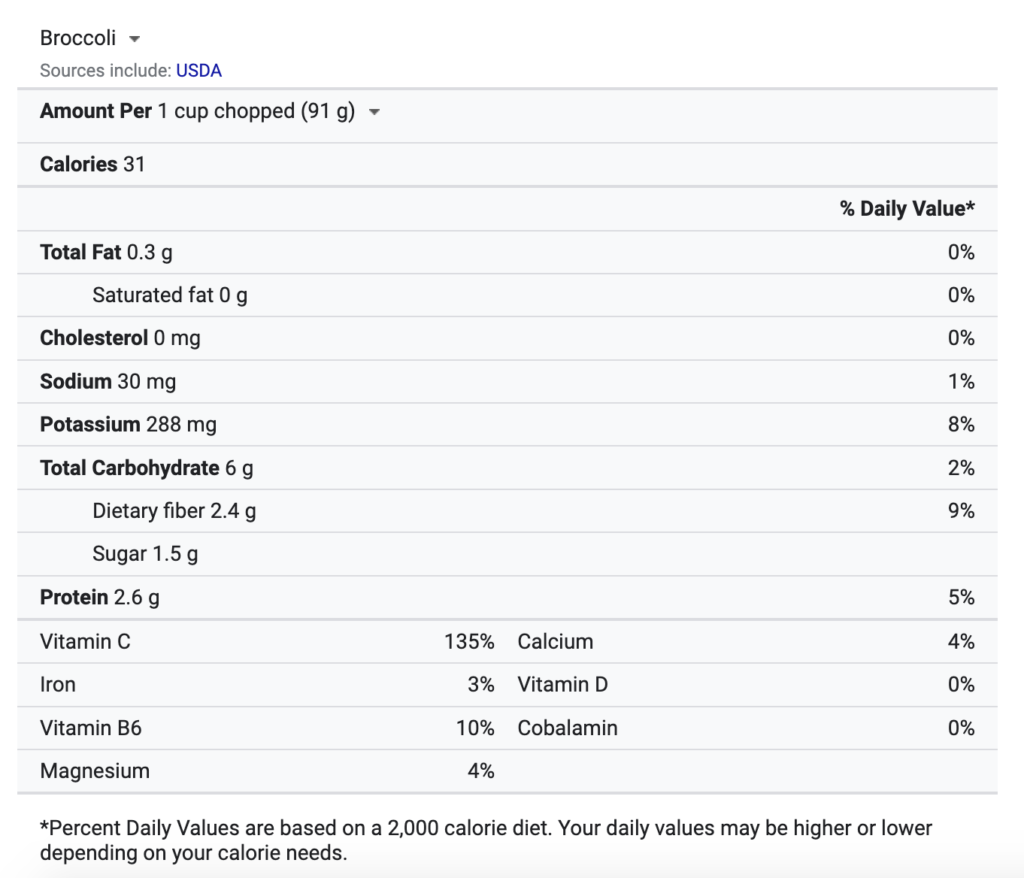
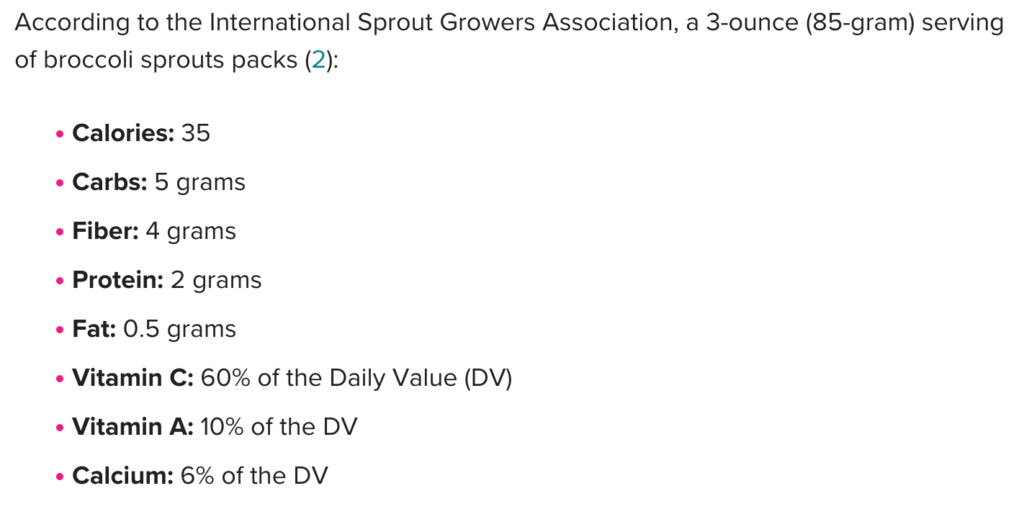
As you can see, the amount of carbs, fat, dietary fiber, and protein in the same weighed amount of broccoli and broccoli sprouts is almost identical. Both have around 5 grams carbs, 4 grams fiber, 2 grams protein, and 0.5 grams fat.
Keep in mind 90 grams of broccoli is going to be far less in volume than 90 grams of broccoli sprouts. Therefore, you’re getting a lot more nutrient in the form of vitamins and minerals in broccoli sprouts than you are from the same weighed amount of broccoli. But, you're also going to need to eat a whole lot more broccoli sprouts than broccoli for these benefits, due to broccoli sprout's small and light nature.
So there’s the nutrient value regarding carbs, fats, and proteins found in broccoli and broccoli sprouts. Pretty similar so far!
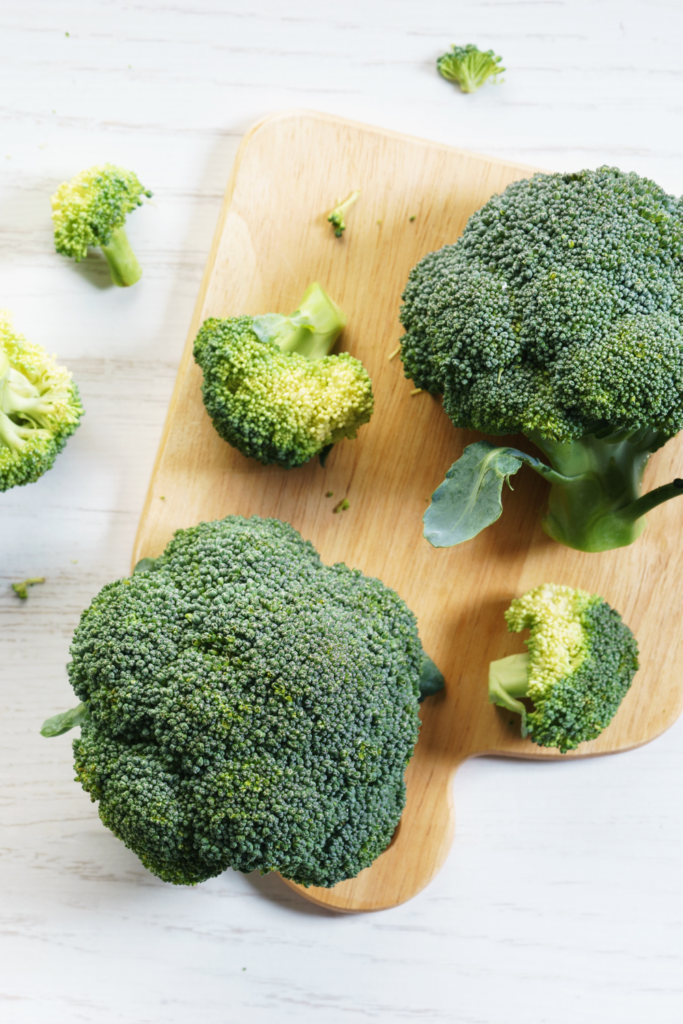
Let’s explore more of the vitamin and mineral compounds found in both and how they may benefit our health.
Vitamins and Minerals In Broccoli vs Broccoli Sprouts
Broccoli itself is rich in immune-boosting vitamins and minerals, but broccoli sprouts could contain anywhere from 10 to 100 times more than broccoli alone!

Most of these vitamins below are antioxidants that boosts your immune system and protects cells from damage by free radicals. Free radicals create excess oxidative stress that may lead to ma y lifestyle diseases. This is why consuming a wide variety of fruits and vegetables that contain antioxidants is important.
Let’s take a look at how many vitamins and minerals we can consume when eating broccoli vs broccoli sprouts:
- Vitamin C: Broccoli and broccoli sprouts both contain a great amount of vitamin C, but broccoli contains about 3x the amount of vitamin C than broccoli sprouts.
- Vitamin E: Broccoli sprouts contain 7.5 mg of vitamin E per cup while broccoli contains just 1.5 mg per cup (making broccoli sprouts more than 6x higher in vitamin E).
- Vitamin A: Broccoli contains about 2x the amount of vitamin A (1,000 IU in one half-cup serving) than the amount found in broccoli sprouts.
- Vitamin K: Broccoli sprouts are a better source of vitamin K, with about 35 micrograms per half-cup serving, far exceeding broccoli’s 0.4 micrograms amount per half-cup.
- Enzymes: Broccoli sprouts contain about 100 times more enzymes. Enzymes are necessary for your body to easily breakdown the nutrients found in food, meaning more bio-availability of nutrients!
Both broccoli and broccoli sprouts also contain modest amounts of iron, calcium, selenium, magnesium, phosphorus, potassium, and many other vitamins, minerals, and anti-inflammatory properties.
It seems broccoli is higher in some vitamins while broccoli sprouts is higher in others. Keep in mind the bioavailability from each nutrient is important as well. No matter the score, both broccoli and broccoli sprouts play an important role in better health and well-being.
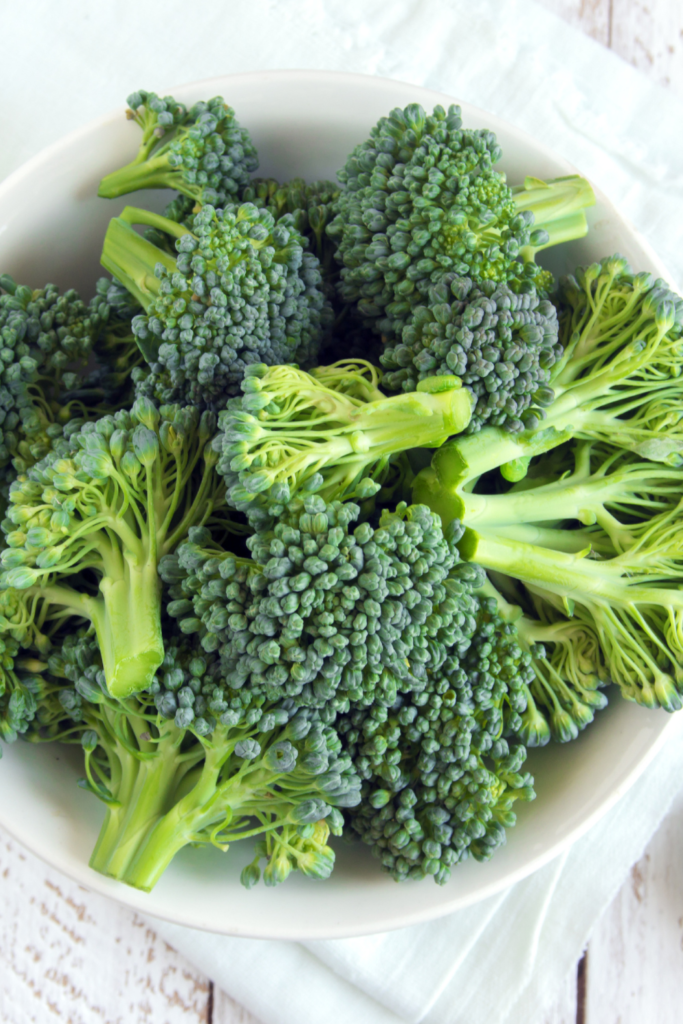
Cancer-Fighting Compounds In Broccoli vs Broccoli Sprouts
The main cancer-fighting compounds found in broccoli and broccoli sprouts are isothiocyanates, which later turn into sulforaphane.
Sulforaphane is a sulfur-rich compound found in cruciferous vegetables like broccoli, bok choy, and cabbage.
Healthline
Eating broccoli in its raw or slightly steamed form provides the most amount of sulforaphane, while the amount dramatically reduces if broccoli is cooked, microwaved, baked, or sauteed for a longer amount of time. Read more about conserving broccoli and broccoli sprouts nutrients here.
The same is true for broccoli sprouts; you may reap the most health benefits when consuming broccoli sprouts raw or lightly steamed. There is one main difference between sulforaphane in broccoli vs broccoli sprouts:
Compared to broccoli, broccoli spouts could contain 100 times more glucoraphanin; the inactive compound that’s converted into sulforaphane upon cutting or chewing.
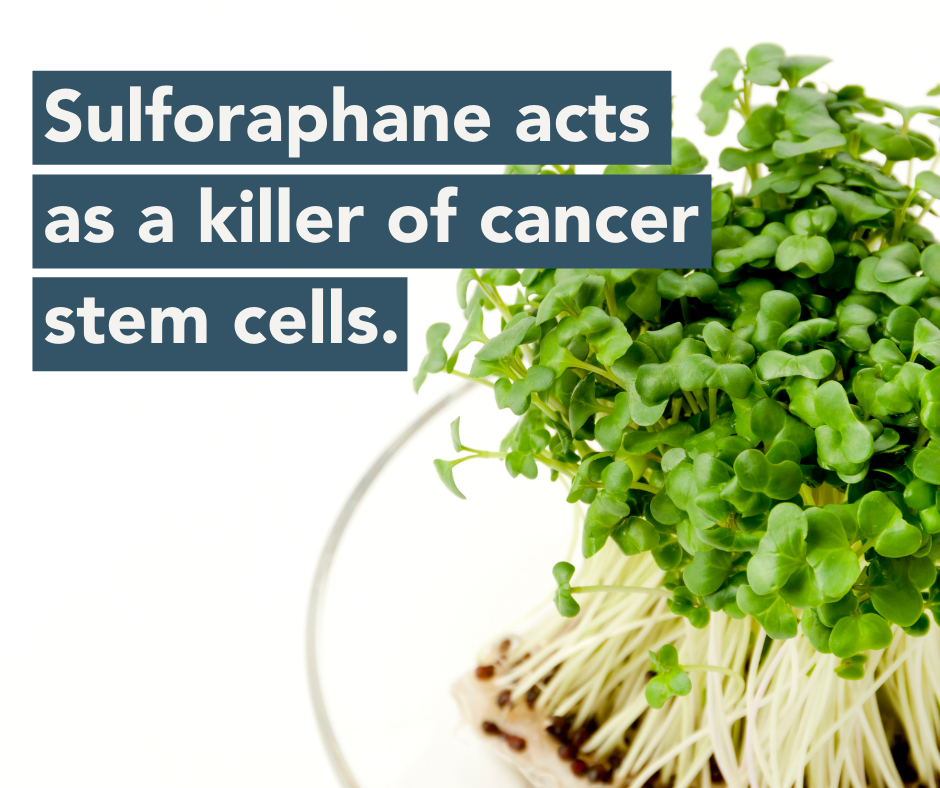
Sulforophane is an anti-cancer powerhouse. It’s anti-cancer effects can greatly reduce the risk of cancer (namely breast cancer, prostate cancer, stomach cancer, and many other kinds).
When it comes to lowering breast cancer risk, sulforaphane in broccoli and broccoli sprouts acts as an “estrogen blocker”. This means it stops the bad estrogens or too much estrogen from growing malignant tissue, and safely allows the excess estrogen to exit the body. Read more about how broccoli sprouts are the #1 food for estrogen dominance.
Cancer prevention is more critical now than ever before. We are constantly needing to combat the cancer-inducing chemicals around and inside of us.
Broccoli and broccoli sprouts contain much-needed cancer-fighting compounds. Broccoli sprouts contain 10-100 times more sulforaphane (a cancer-fighting compound) than mature broccoli, making broccoli sprouts a special cancer-fighting food!

Heart Disease Prevention From Broccoli vs Broccoli Sprouts
Heart disease is still the leading cause of death in America. One person dies every 34 seconds from cardiovascular disease (CDC). That fact is shocking and hard to swallow.
Consuming broccoli and broccoli sprouts regularly can reduce your risk of heart disease mainly by lowering blood pressures (due to coenzyme Q10) and decreasing the thickness of the carotid artery blood vessel (due to lowering effects on LDL cholesterol).
Broccoli and broccoli sprouts have also been shown to lower LDL cholesterol levels, helping to further reduce the risk of heart attacks, strokes, and the need for cardiovascular surgeries. These affects are mainly due to glucoraphanin, which we learned turns into sulforaphane.
We also saw that vitamin K can support blood clotting when necessary, but broccoli and broccoli sprouts can actually help dissolve blood clots and in turn, could help treat a stroke. Talk about life-saving information!
So which one is better when it comes to cardiovascular health; broccoli or broccoli sprouts?
We now know both glucoraphanin and vitamin K are key contributors to heart health. Since we found out broccoli sprouts are 10-100 times higher in sulforaphane and exceedingly higher in vitamin K content than broccoli, we must deduce that broccoli sprouts win this competition category for which is better for heart disease prevention.
Sources: https://www.ahajournals.org/doi/10.1161/jaha.117.008391
https://www.ncbi.nlm.nih.gov/pmc/articles/PMC4692095/

Brain Health Benefits From Broccoli vs Broccoli Sprouts
Neurodegenerative diseases like Alzheimer’s, Huntington’s, and Parkinson’s can completely change the course of someone’s life. Most neurodegenerative disease have no cure to date, so prevention is absolutely key.
When considering foods for brain health, a lot of us gravitate towards green, leafy vegetables, fatt fish, berries, and walnuts. We don’t always consider broccoli or broccoli sprouts as brainpower, but they are!
B vitamins, lutein (related to vitamin A), vitamin E, vitamin D, DHA (omega-3’s), and many trace minerals are essential vitamins for brain health. The good news is, broccoli and broccoli sprouts contain a lot of these brain-boosting elements.
The sulforaphane in broccoli and broccoli sprouts is especially important in protecting against many brain conditions and cognitive declines. Remember, broccoli sprouts contain a lot more sulforaphane content than mature broccoli. So if you’re choosing between the two based on this information alone, go for the broccoli sprouts.
A group (not having a control group or clinical trial) found that consuming broccoli sprouts as part of a whole foods diet made a significant improvement in outcomes for kids with CP, ADHD, autism, and other conditions. Anecdotal or not, I’m incorporating more broccoli sprouts in my childrens’ diet for sure! Find more info on this here.
Other Sources: https://medlineplus.gov/degenerativenervediseases.html
How To Grow Your Own Broccoli Sprouts
It is pretty easy to make your own broccoli sprouts. The sprouting process might seem confusing or overwhelming, but once you get started you’ll see how simple it can be to grow your own superfood!
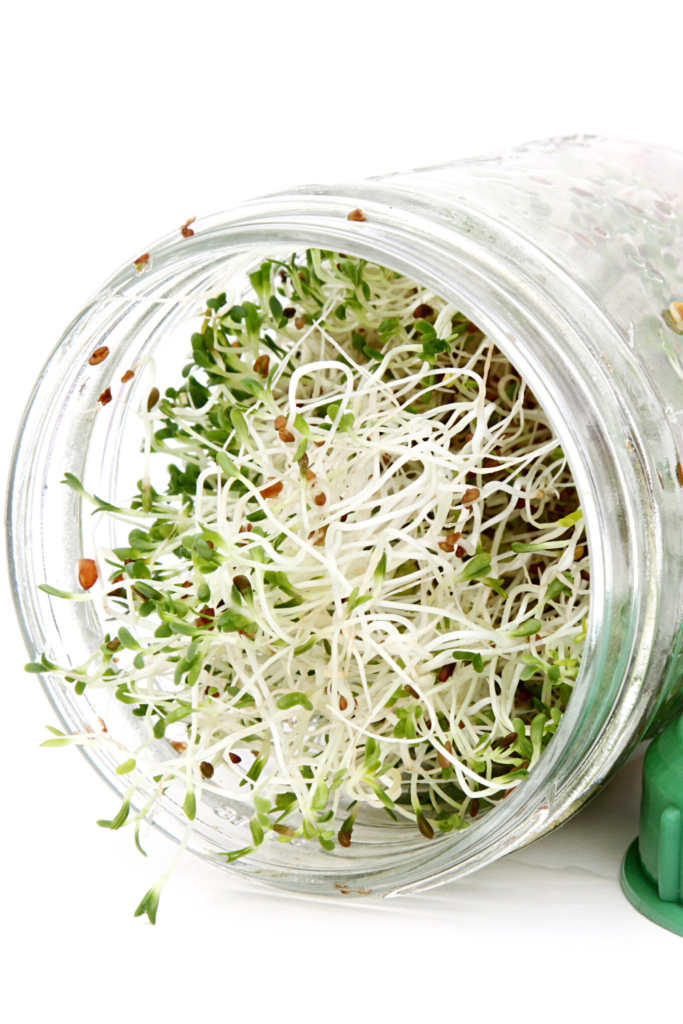
Sprouts at the grocery store are usually pretty pricey for a small amount. When growing your own, the sprouts made come out to cost pennies! So if you’re living on a budget but feel you need sprouts in your life, making them at home is the most cost-effective way.
- Soak 2-4 Tbsp. of seeds for 12-24 hours covered with filtered water.
- Spread evenly (don’t overpack) over a growing tray or add to a sprouting jar.
- Rinse and drain 2-3x per day. If you’re using a tiered tray, rotating the trays from top to bottom will allow the sprouts to grow evenly.
- Sprouting will begin. Keep the jar or tray in a cool area as too much humidity could cause mold. If you see a little white fuzz, this is most likely the tiny root hairs of the sprout, so don’t worry! If the sprouts smell or become slimy, discard and start again with a sanitized jar.
- After 4-6 days, your sprouts will be longer and greener. Around this time, they will be ready to eat!
- Dry the sprouts on a cloth tower or in a salad spinner and store in a glass jar in the refrigerator.

Notes:
- Always buy organic broccoli seeds. You don’t want to mess with pesticides and herbicides when sprouting seeds, plus most non-organic seeds do not sprout well.
- Always use filtered water when soaking and rinsing. The sprouts are growing from this water, so you don’t want them growing with chemicals from the water.
- Sprouts will save for 2-3 days in the fridge, but fresh broccoli sprouts have the most nutritional benefits.
Other Types of Sprouts You May Try:
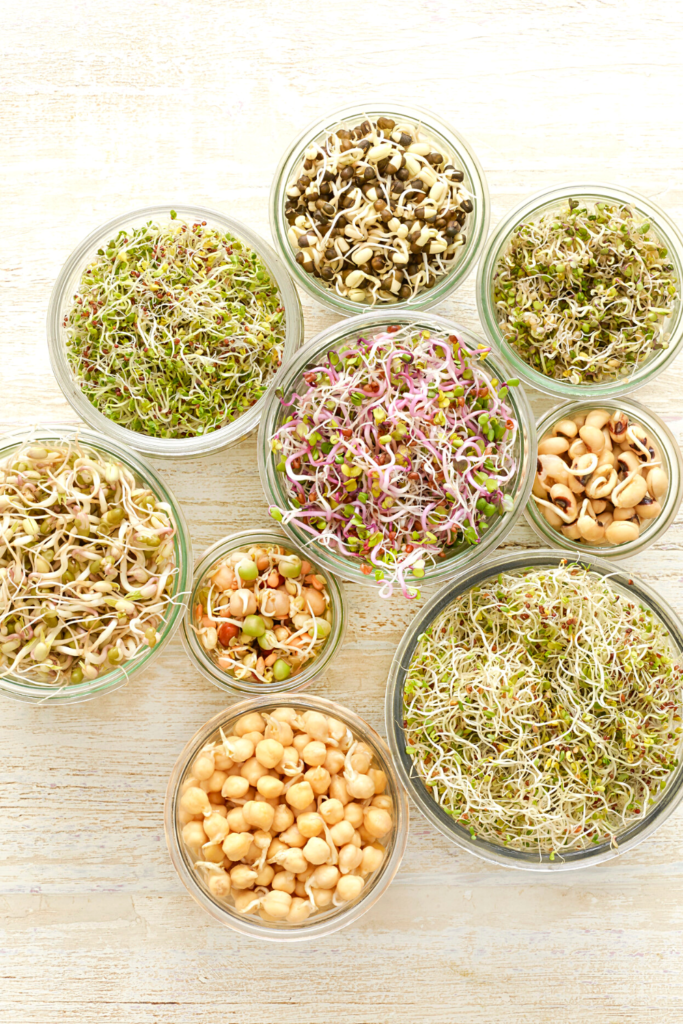
- Radish Sprouts
- Alfalfa Sprouts
- Arugula Sprouts
- Mung Bean Sprouts
- Clover Sprouts
- Lentil Sprouts
- Sunflower Sprouts
A Note About Broccoli Microgreens
There are various stages of broccoli. This article outlines broccoli sprouts and mature broccoli plants. There is another stage that has gained popularity and that is broccoli microgreens.

As I mention in this article, broccoli sprouts and broccoli contain different levels of various vitamins and minerals. The same is true of broccoli microgreens. If you want to add to your broccoli options, try this one for a change.
In order to grow broccoli microgreens, you need a grow tray, grow lights, broccoli microgreen seeds, and potting soil. It’s not quite as simple as broccoli sprouts, but it is satisfying to grow yourself plus you’ll introduce an even wider variety of vitamins, minerals, and phytonutrients to your body!
Broccoli vs Broccoli Sprouts When Cooking
Cruciferous veggies like broccoli, brussels sprouts, cabbage, and cauliflower are delicious when cooked.
My favorite ways of cooking cruciferous veggies is to lightly steam and consume with hummus, salt, and pepper or continue after steaming to roast on a baking tray until crispy. I also like to add raw broccoli, broccoli sprouts, cabbage, or cauliflower to my salads (diced well).
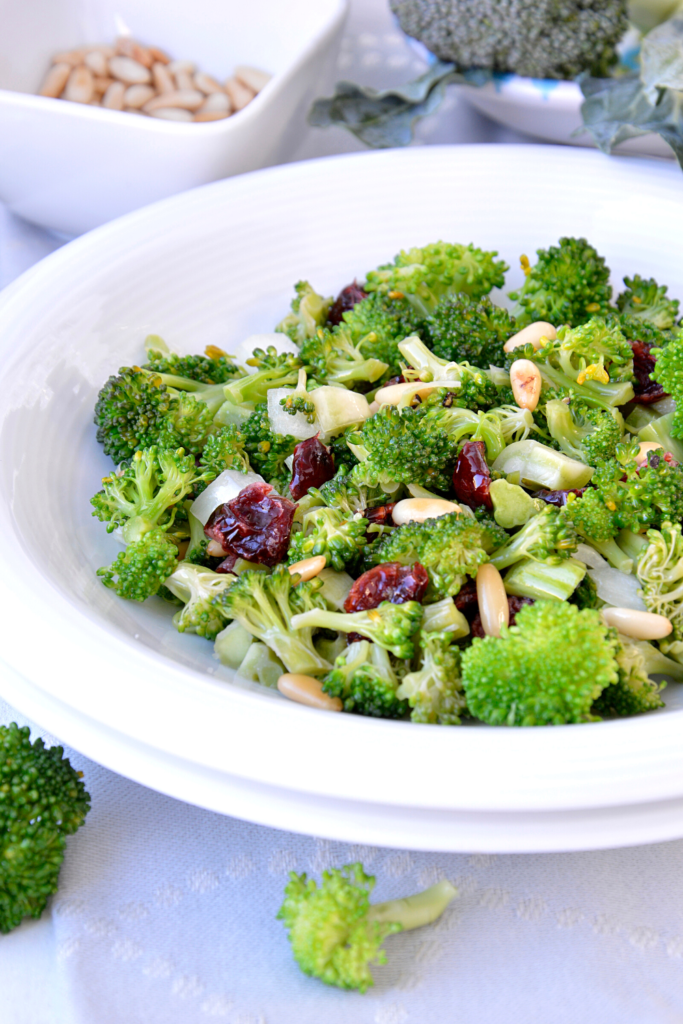
When it comes to cooking with broccoli vs broccoli sprouts, I think broccoli wins this category. It is a volume food, meaning you can fill your plate with broccoli and feel satisfied after, even if the level of calories is fewer than other foods. It also goes well with almost any dish!
I do like to consume broccoli sprouts as a later addition to meals. I sprinkle my broccoli sprouts on top of any plate of food to add various nutrients to the dish. I also add a handful of broccoli sprouts to my salad as a different kind of ‘lettuce’ to enjoy.
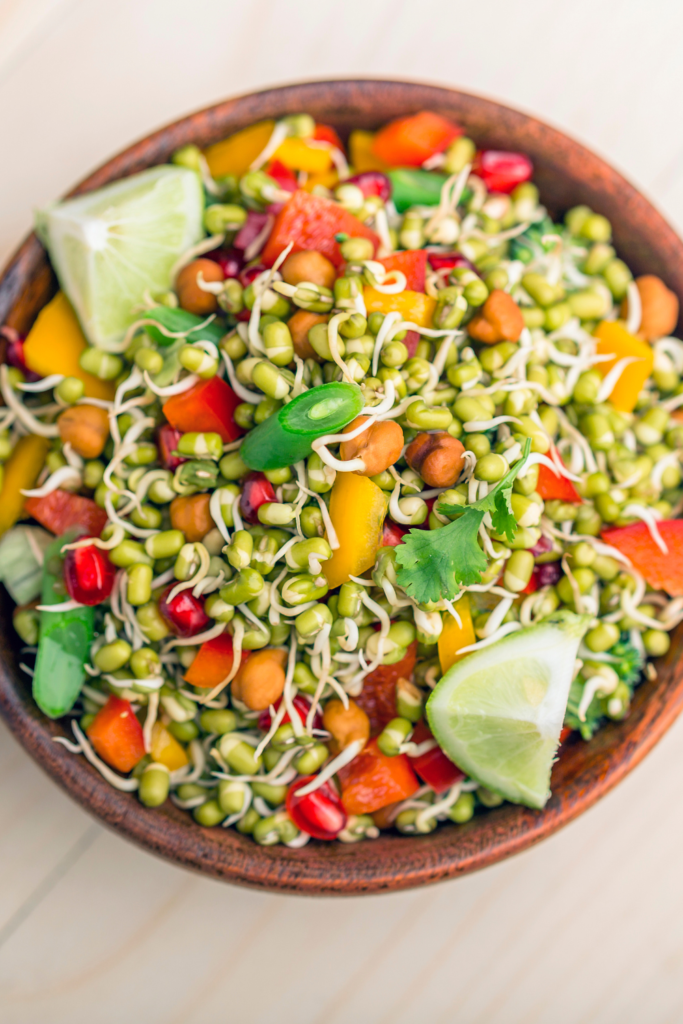
The best way to keep all the nutrients in tact when cooking these vegetables is to lightly steam or consume raw. Any cooking method that uses heat above 125 F will inevitably lose some nutrients associated with the food.
That being said, best way to consume health-promoting cruciferous vegetables like broccoli or broccoli sprouts is your favorite way.
Risks Associated With Broccoli and Broccoli Sprouts
There are very few risks or side effects associated with broccoli and broccoli sprouts, but it is always a good to be well-educate about the food you’re consuming.
It has been studied that too much sulforophane (more than 200 mg/kg) may be detrimental to health. These were based on animal studies and they found that:
High doses of sulforaphane produced marked sedation (at 150–300 mg/kg), hypothermia (at 150–300 mg/kg), impairment of motor coordination (at 200–300 mg/kg), decrease in skeletal muscle strength (at 250–300 mg/kg), and deaths (at 200–300 mg/kg).
NIH
Of course, too much of a good thing can always have some risks associated. Keep the old saying in mind: the poison is in the dose. Too much broccoli could look like buckets of broccoli heads or big scoops of broccoli sprouts every hour of the day. Most likely, you are not getting close to this level of consumption.
Another possible risk is food poisoning due to the humid environments needed for broccoli sprouts to grow, as this could be a breading ground for bacteria (such as e. coli) or mold. This risk of consuming bacteria or mold-infested food could be higher for pregnant women as the risk of food poisoning can affect the baby in the womb as well.
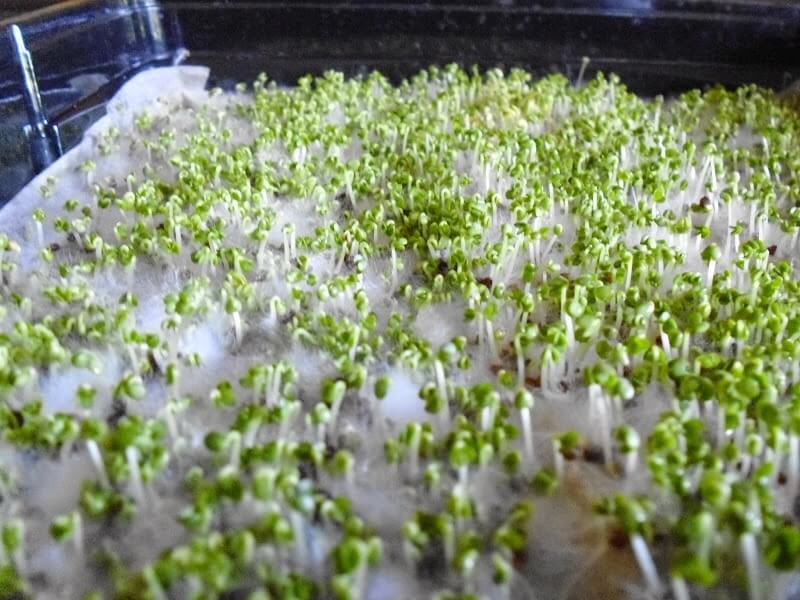
It is always good to practice safe hygiene, check for mold, rinse thoroughly and often, and consume within the expiration date when growing and/or consuming broccoli and/or broccoli sprouts.
Even though there could be some risk involved when consuming broccoli sprouts while pregnant, broccoli sprouts could also provide life-long protection against disease for both the mother and baby when consumed during pregnancy! Read more about how the mother could protect their unborn child with sprouts here.
Daily consumption of broccoli and broccoli sprouts in modest amounts have been found to be greatly beneficial to human health, with little to no risk associated. So keep on eating both broccoli and broccoli sprouts!
Sources:
Broccoli And Broccoli Sprouts?
In conclusion, broccoli sprouts do contain higher amounts than broccoli of many vitamins and minerals, including the very important compound sulforaphane. But that’s not to say broccoli cannot have an important part in your diet as well.
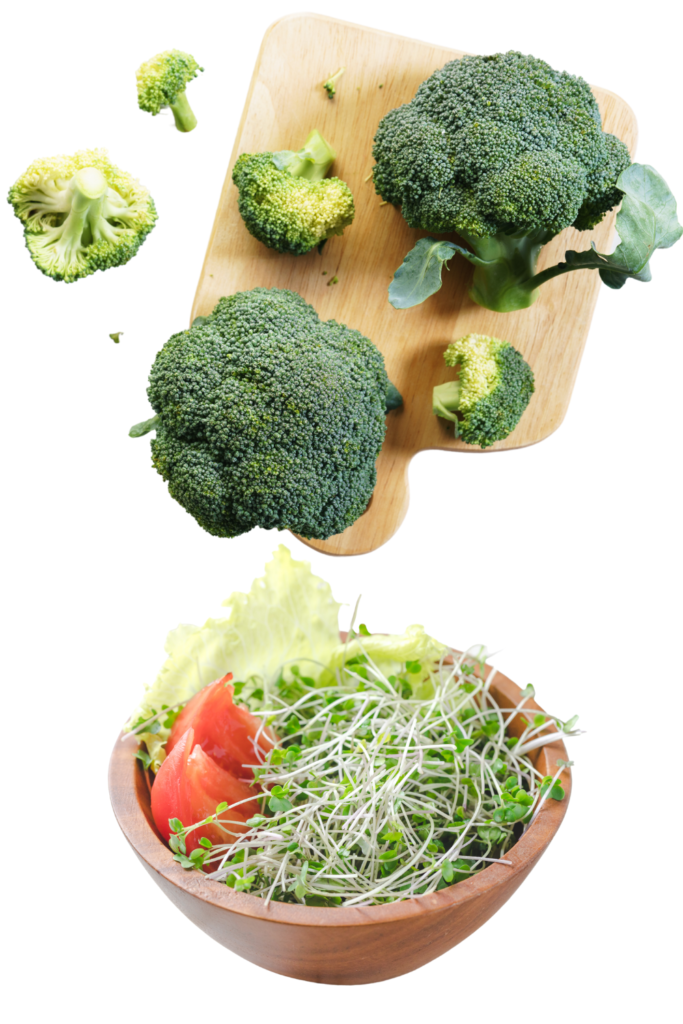
Both broccoli and broccoli sprouts are a healthful and necessary part in your diet. They contain varied amounts of many vitamins and minerals. The body utilizes the two forms of broccoli in different ways, which is why we should consume both.
My advice to you is to start growing your own broccoli sprouts and have a never-ending supply on hand to toss into salads, soups, sandwiches, smoothies, or just chow down on a handful every now and then.
This practice of consuming more broccoli sprouts does not need to take the place of mature broccoli, though. Broccoli is a deliciously crunchy veggie when raw (enjoy with some hummus) and goes perfectly in any stir fry.
I hope you enjoyed this article and gained a new perspective of broccoli vs broccoli sprouts. If you have a minute, please leave a quick comment below and let me know what you found most interesting about this. And as always, share on social media to allow others to “Get Planted”!





[…] smoothies, chlorophyll can be a fantastic addition. It complements the natural green color of leafy greens and adds an extra layer of nutritional value. A chlorophyll-infused green smoothie can be a […]